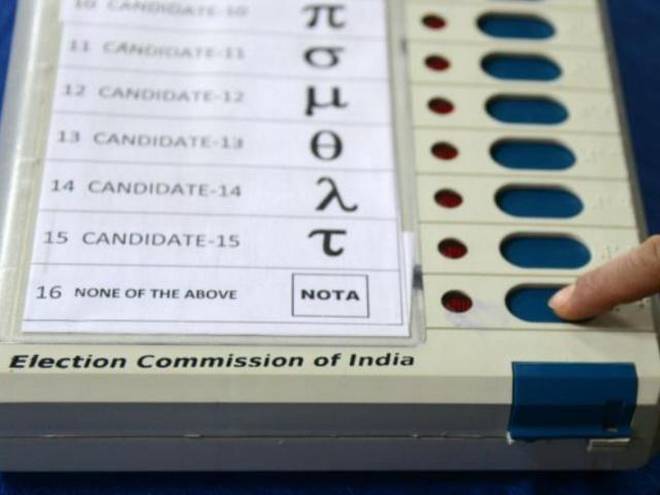Cash, drugs and liquor valued at over Rs. 2500 crore have been seized across the country since the beginning of the Lok Sabha poll process till April 15, 2019. It is stated to be double that of 2014 polls. During the late 2018 assembly, it was said, that some parties opened money bags to “help” voters and each vote cost Rs. 5,000 or more in cash. This shows how money continues to play a crucial role in luring the voters and making a mockery of the entire democratic system.
There is a growing discontentment among voters. As a result more and more voters are pressing the NOTA button. Infact, the ‘None of the Above’ (NOTA) ballot option has caused a new concern among political circles. Political parties have been telling voters not to press the button.
The Election Commission (EC) figures say that the highest 2.5 percent NOTA were registered in Chhattisgarh and 0.5 percent in Mizoram during 2018 state polls. It affected prospects in 22 constituencies in Madhya Pradesh; 15 each in Rajasthan and Chhattisgarh. Five states – Chhattisgarh, MP, Rajasthan, Mizoram and Telangana – registered 8.44 lakh NOTA votes in 2018. NOTA secured a total of 1.33 core votes in elections held between 2013 and 2017, according to an analysis of Association for Democratic Reforms (ADR). It is becoming a game changer much to the chagrin of political parties.
Despite demonetization, which was supposed to have eliminated black money, the seizure of cash during polls is on the rise. In Vellore alone over Rs 11.48 crore packed in plastic bags, with ward-wise details, was seized from a DMK functionary. The EC cancelled polling in Vellore LS seat in Tamilnadu after detecting “systematic design to influence voters through large-scale distribution of cash. It would severely jeopardize the conduct of free and fair election”. The EC wrote to the President on April 16. Gujarat recorded highest seizure valued at Rs 509 crore. A seizure of liquor off the state’s coast is estimated at Rs 500 crore. The figures for Andhra Pradesh are Rs 158.61 crore, Punjab Rs 144.39 crore, Nagaland Rs 92.26 crore in cash 62000 litres of liquor – total of Rs 3.02 crore and UP Rs 135.13 crore. The figures from other states are trickling in. According to an estimate EC seizures are estimated at Rs 100 crore a day.
With seizure of so much cash during the elections, a pertinent question that comes to mind is how do the parties get their funding? According to National Election Watch, 8.9 percent of the income of parties is from unknown sources, 2.16 percent from the electoral bonds. The Congress earns 82 percent from unknown sources and the BJP 73 percent. They say these are through voluntary contributions or sale of coupons.
Data show that six electoral trusts donated about Rs 105 crore to national parties between 2005 and 2012 before transparency guidelines were introduced in 2014 mandating disclosure of donors. From 2014 and 2017, nine registered electoral trusts donated a total Rs 637.54 crore to political parties. The contribution to political parties rose from Rs 85 crore in 2014 to Rs 325.27 crore in 2017.
The BJP was the biggest beneficiary. About Rs. 10 crore went to the cash-strapped Congress and Rs.5 crore to Odisha’s Biju Janata Dal and other parties including Shiromani Akali Dal, Samajwadi, AAP and Rashtriya Lok Dal. Thus fund raising is a difficult issue. It helps the ruling or larger parties at the Centre and states. Congress had benefitted earlier and now the BJP is having an advantage.
Money plays crucial role. The corporate-type functioning of the parties, tight-fisted approach of the leaders, reminiscent of the Indira Gandhi era, raise many questions. If money flows in, external influence is natural. Are the parties really having a democratic functioning though all say they adhere to it? All parties love the autocratic structure. Smaller it is, more is the stranglehold. Lobbies penetrate these as one or the other has importance in different regions. This mocks internal democracy. So buying votes, as has been alleged in Supreme Court, now is the custom to save huge investments. A change in government can make or mar companies. Since all are beneficiaries, none raises the “political” issue.
Deep cleansing of the system is needed. NOTA is possibly exposing the unholy nexus. EC has taken the right step in Vellore, now it needs to popularise NOTA.

